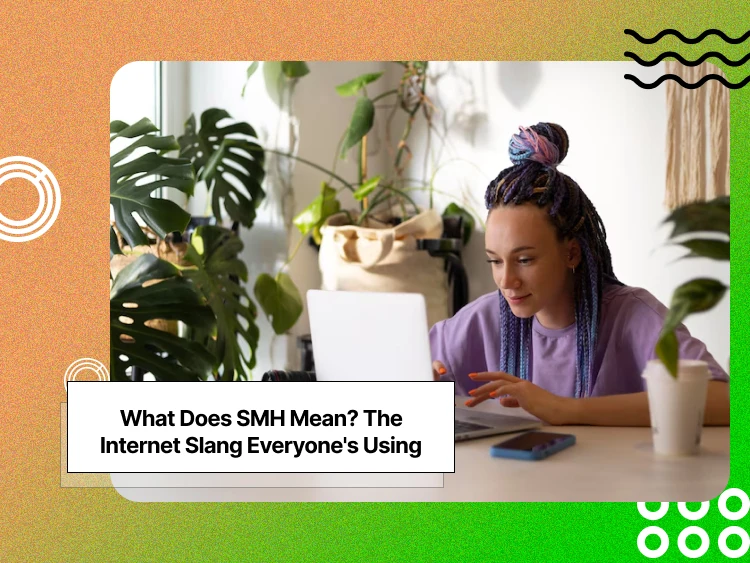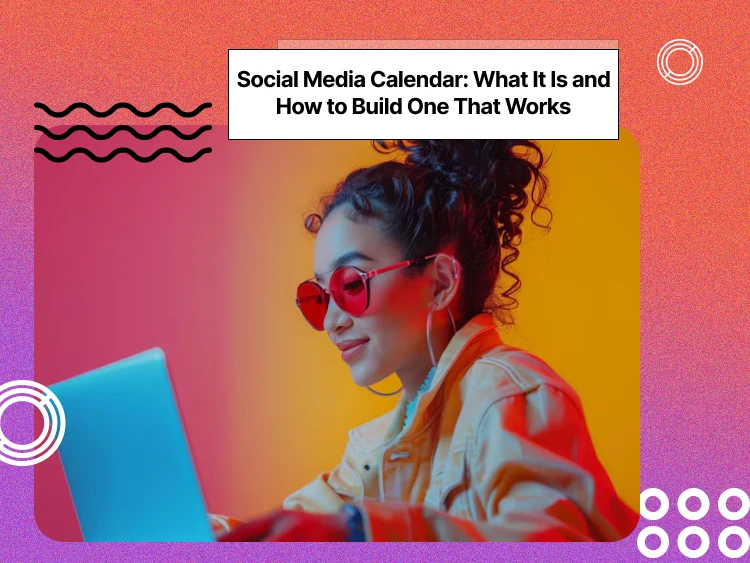Let me tell you something! In the constantly changing world of online communication, keeping up with internet slang can be like learning a new language. Especially if you’re not among the younger generation, you will have a long way ahead!
One of the most used slang terms or abbreviations in online chats is “SMH.†Have you ever seen it on social media?
When my friend came across this three-letter acronym, he thought it was about hushing someone! However, it’s not! SMH stands for Shaking My Head! I bet you didn’t see that coming!
“SMH†is now a staple of online communication, but does it ned here? No! Understanding its proper use and context is way more important.
Whether you are a brand manager and want to speak with your audience genuinely or simply an ordinary individual who would prefer to know what your teenager’s messages mean, familiarizing yourself with internet abbreviations like SMH can encourage you to be more assured while chatting online.
Let’s break down this trending phrase, determine where and when to apply it, and see how it exists in the broader context of internet communication.
What Does SMH Mean on Social Media?
“SMH†stands for shaking my head. It’s one of those internet acronyms that people use when they’re reacting to something that’s disappointing, frustrating, or just plain ridiculous. You’ll see it pop up in tweets, comments, texts — basically anywhere people express reactions online.
Let’s say someone shares a story about paying $20 for a slice of pizza in New York. Someone might reply with “SMH†to show they’re baffled or low-key judging. It’s not necessarily angry — more like a digital facepalm.
Whether you’re reacting to bad decisions, wild news, or even poking fun at a friend, it’s a quick way to say, Wow… I can’t even.
How “Shaking My Head†Became a Popular Expression
SMH means shaking my head — that reaction when something’s so dumb or frustrating, all you can do is shake your head. No words. Just… Why?
It started showing up online in the early 2000s, back when people were texting more and chatting in forums. Typing everything out took too long, so little shortcuts like this just made sense.
By around 2010 or so, SMH blew up — especially on Twitter, where you had to keep it short. Even Google searches for it spiked around that time, which kinda shows how fast it caught on.
What’s cool is, SMH didn’t come from one specific app or group — it just showed up all over the place. And honestly, that’s probably why it spread so fast. Everyone knows what it means to shake your head. It doesn’t need much explaining.
When and Why People Use SMH on Social Media
People usually drop “SMH†when something makes them roll their eyes — not in a super angry way, but more like, “Come on, really?†It’s the kind of reaction you have when you see someone doing something dumb, wild, or just plain confusing, and you don’t feel like going into a full rant.
You’ll see it used in all kinds of situations, when someone posts a bad take, makes a terrible decision, or when the news is just so ridiculous you don’t even know what to say. Instead of typing out a whole explanation, people just go with “SMH†and keep it moving.
It works because it’s a text version of a gesture we all know: that slow, disappointed head shake. It says a lot without needing to explain much. And let’s be honest, sometimes you don’t want to explain — you just want people to feel the reaction.
When Is SMH Appropriate vs. Potentially Offensive?
You’ll see “SMH†a lot online, usually when someone’s reacting to something kinda dumb or frustrating. It’s the sort of thing people drop in texts or comments when they don’t feel like going on a whole rant. Just a quick “wow†or “seriously?†kind of vibe.
That said, it’s not something you want to throw around everywhere. Like, if someone’s sharing something personal or serious, replying with SMH might come off as cold, or like you’re not listening. Same goes for work stuff. It’s one of those things that works fine in casual convos but can feel off in more sensitive or professional settings.
A lot of the time, people aren’t upset by what you said, but by when or where you said it. SMH’s fine in the right spot. Just gotta read the room.
Different Variations of SMH You Might See Online
Once “SMH†started catching on, people did what the internet always does: they gave it a few twists to add extra feeling. Same vibe, just a little more flavor depending on the mood.
Here are some common ones:
SMFH – Shaking my f**ing head. SMH, but with way more frustration or disbelief. Usually shows up when something’s just next-level dumb.
SMDH – Shaking my damn head. Still stronger than the regular version, but not as intense as SMFH.
SMHS – Shaking my head sadly. This one leans more into disappointment than irritation. It’s like, “Ugh… this is just sad.â€
SMH + emojis – You’ll also see people throw in facepalms, eye rolls, or sighing emojis alongside SMH to drive the feeling home.
You might also notice the way it’s typed changes the tone a bit. All lowercase — smh — usually feels chill or sarcastic, like you’re just over it. But when it’s in all caps — SMH! That’s when someone’s fed up.
Emerging Slang Terms That Could Replace SMH
While SMH continues to hold its ground, several newer expressions compete for similar communicative territory:
– “I can’t evenâ€: Expresses similar exasperation but with greater emphasis on being speechless.
– “Dead†or “💀â€: Indicates being metaphorically “killed†by disbelief or shock.
– “Bruh momentâ€: Signals a situation worthy of judgment or disbelief.
– “Sending thoughts and prayersâ€: Often used sarcastically to indicate something is hopelessly misguided.
Common Situations Where SMH Is Perfectly Used
You know that feeling when you scroll through social media and just want to shake your head quietly? That’s exactly when SMH comes in handy. It’s made for those moments.
Showing Disappointment Without Drama
Sometimes stuff online is just disappointing, but you don’t want to start a fight or a big argument. That’s when people drop “SMH.†It’s like saying, “Seriously?†without getting all worked up. You see it a lot in comments when people notice something dumb or weird but don’t want to make a big deal out of it.
For brands watching what people say, a lot of “SMH†replies can be a sign that people aren’t happy, but they’re not yelling about it either. It’s kind of like a quiet “meh†or a sigh.
Reacting to Crazy News or Viral Stuff
When you see some wild headline or a trend that makes you go “huh?†SMH is the perfect way to say, “I don’t buy this.†On Twitter or TikTok, where people see tons of strange stuff every day, SMH helps show that you’re surprised or confused without writing a whole paragraph.
If you make content and notice a bunch of “SMH†comments, it probably means you’ve gone a bit too far from “cool†to “what the heck?†It’s a little heads-up to maybe chill out if you want people to stick around.
5 Popular Acronyms That Work Similarly to SMH
If you want to add some flavor to your online chats besides just saying SMH, here are a few other common phrases people use that pretty much do the same thing:
TBH — means To Be Honest. It’s what you say right before dropping some real talk, sometimes stuff that might be a little bold.
ISTG — stands for I Swear To God. People use this when they’re super serious or kind of fed up with something.
SMDH — means Shaking My Damn Head. Think of it as SMH but with a bit more “Are you kidding me?†energy.
NGL — short for Not Gonna Lie. You say this when you want to be straight-up honest or admit something unexpected.
FACEPALM — basically when you put your hand on your face because you’re embarrassed or just can’t believe what you’re seeing.
All these help make texting feel more like real talk, like you’re showing how you feel instead of just typing words. And here’s a cool bit: studies say about three out of four people who use social media regularly throw around at least three of these expressions.
Using SMH in Text Messages vs. Social Media Platforms
Where you use SMH can change how it comes across. In private texts, it usually feels more personal, like you’re reacting to something specific between you and a friend. But on public social media, SMH often turns into a kind of social signal, showing you’re part of a group or share certain opinions.
A study from Pew Research Center found that about 85% of teens switch up their online slang depending on whether they’re chatting privately or out in the open.
Context matters here. On more professional sites like LinkedIn, you don’t see SMH much, and if you do, it might get misunderstood. But on casual platforms like Twitter or Instagram, it’s just part of how people talk.
How SMH Compares to Similar Reaction Expressions
SMH is part of a bigger crew of quick reaction people use online:
LOL (laughing out loud) — for when something’s funny.
OMG (oh my god) — shows surprise or shock.
How to Value a TikTok Account for Sale




